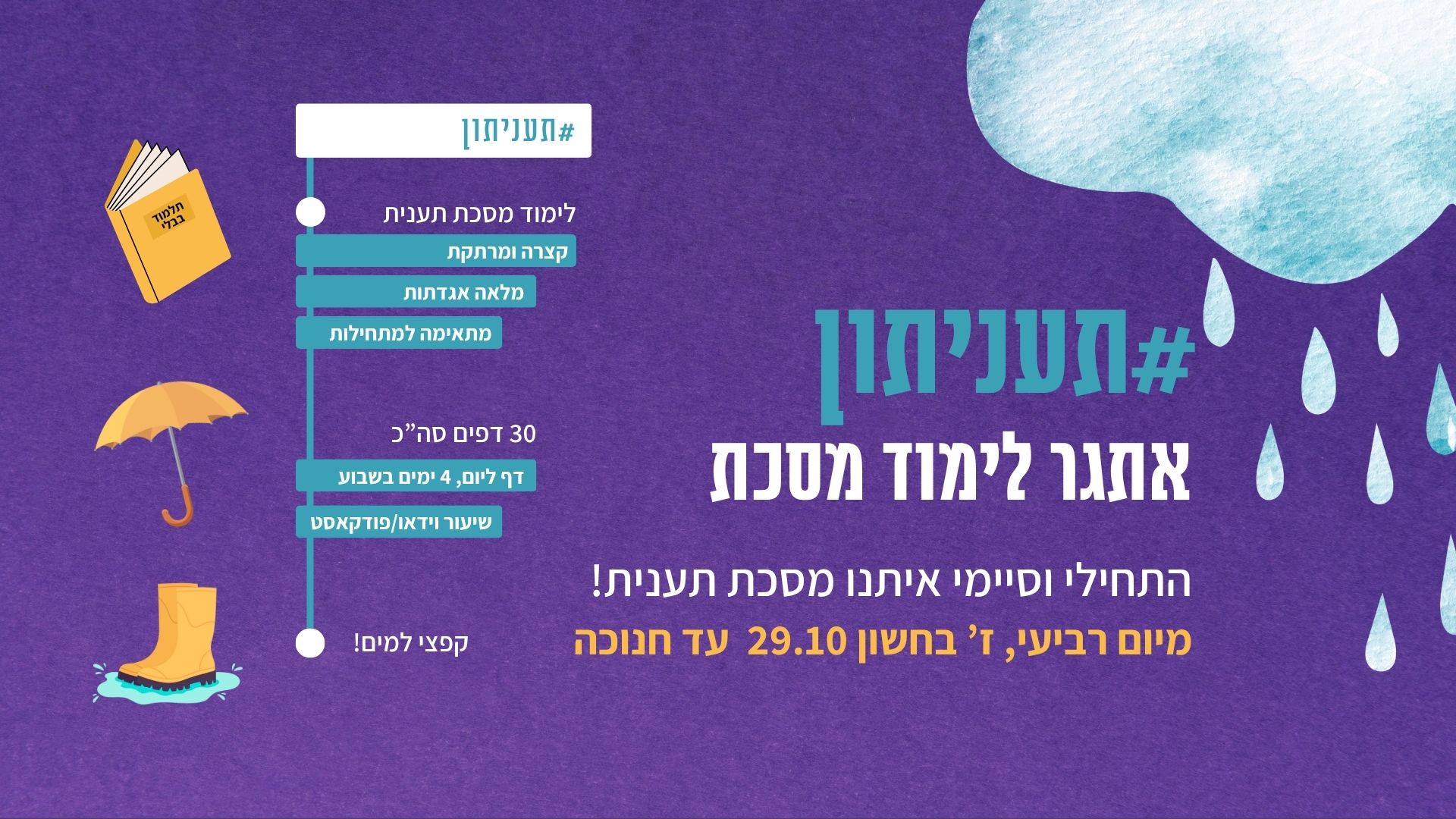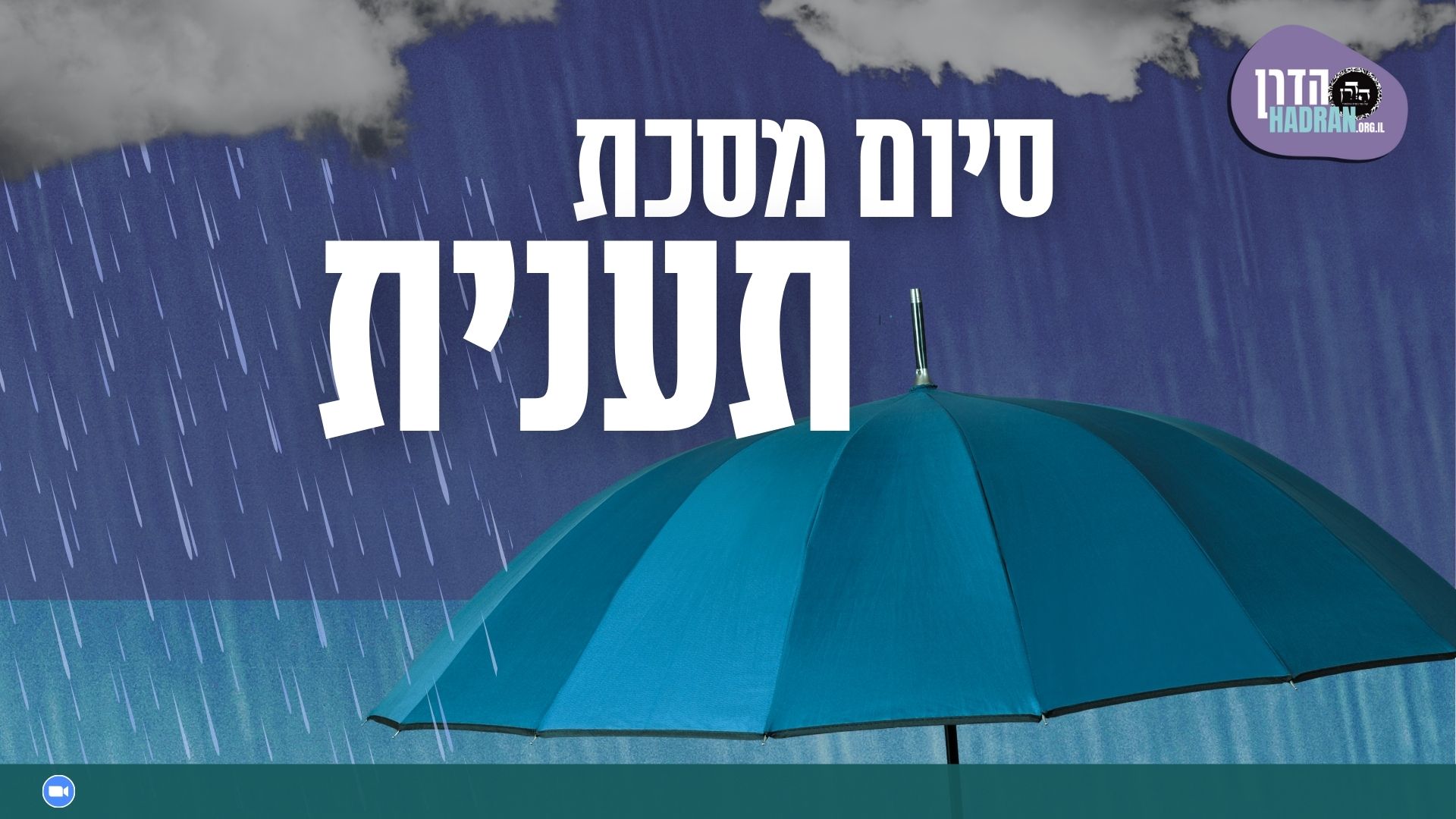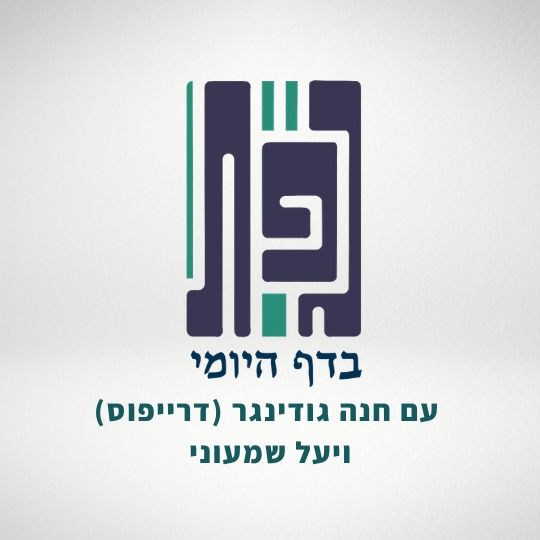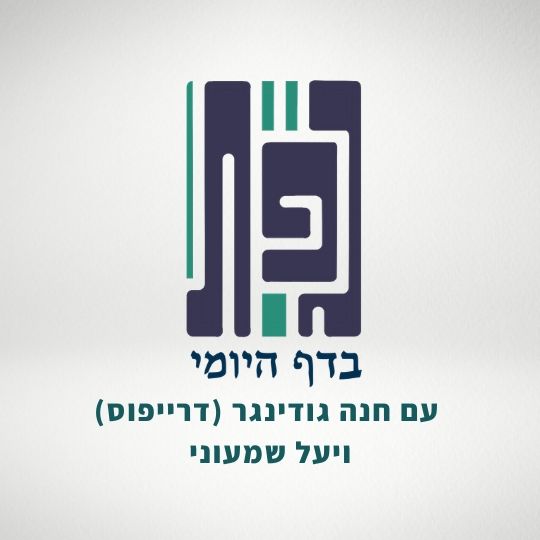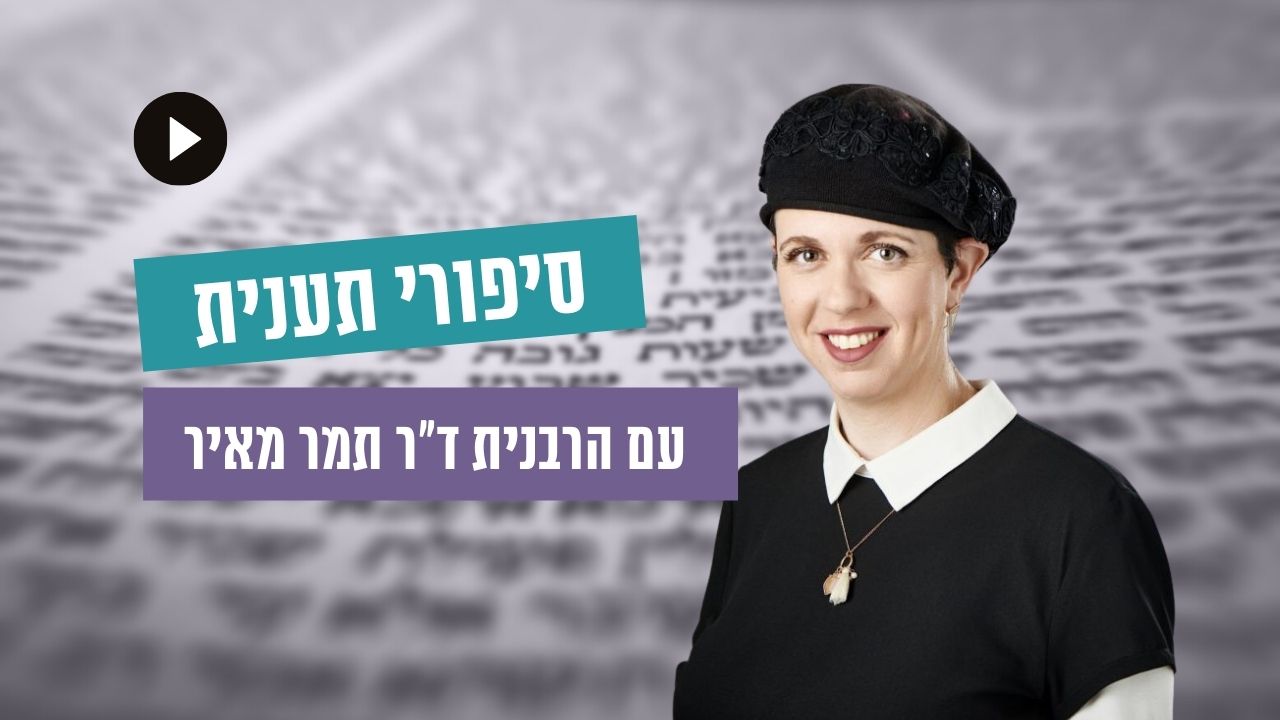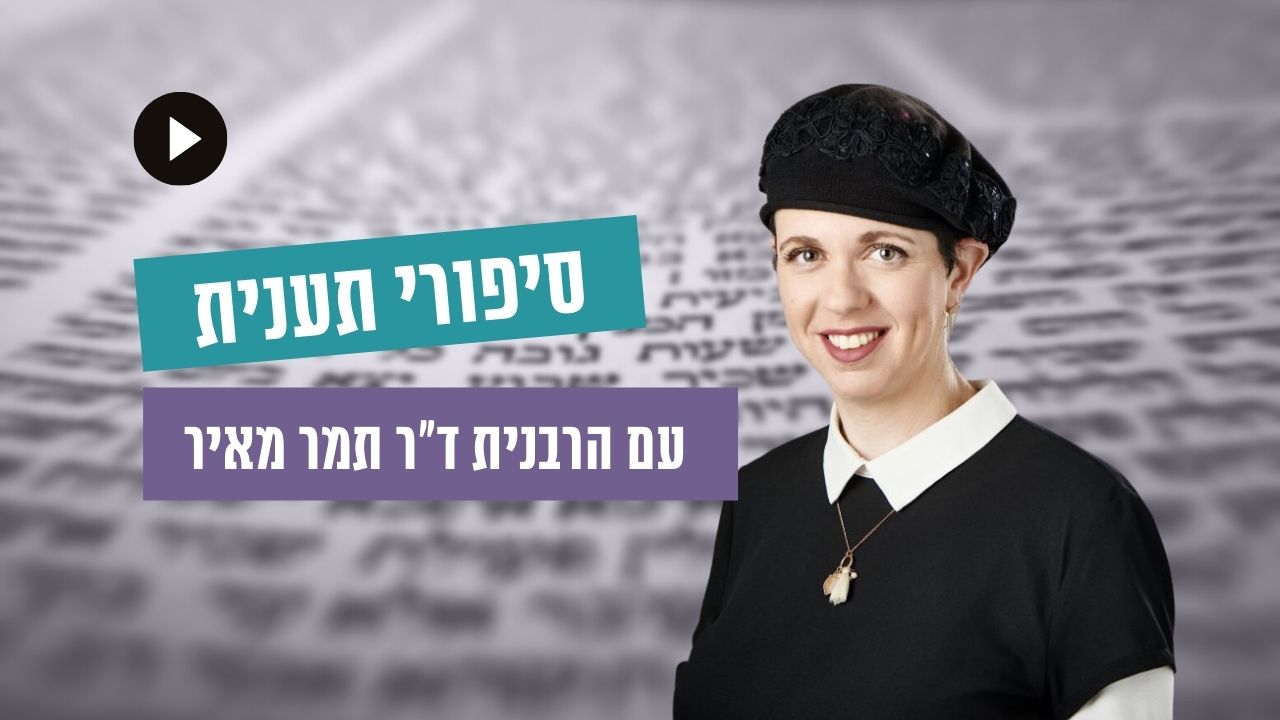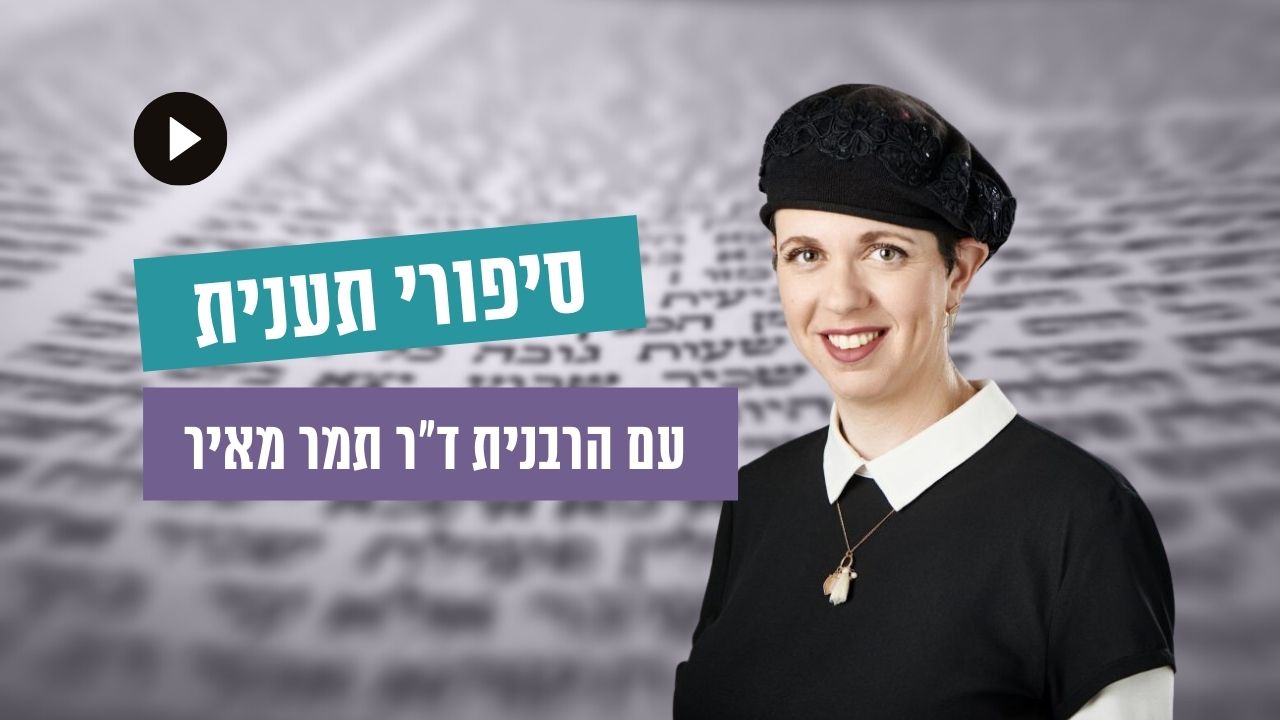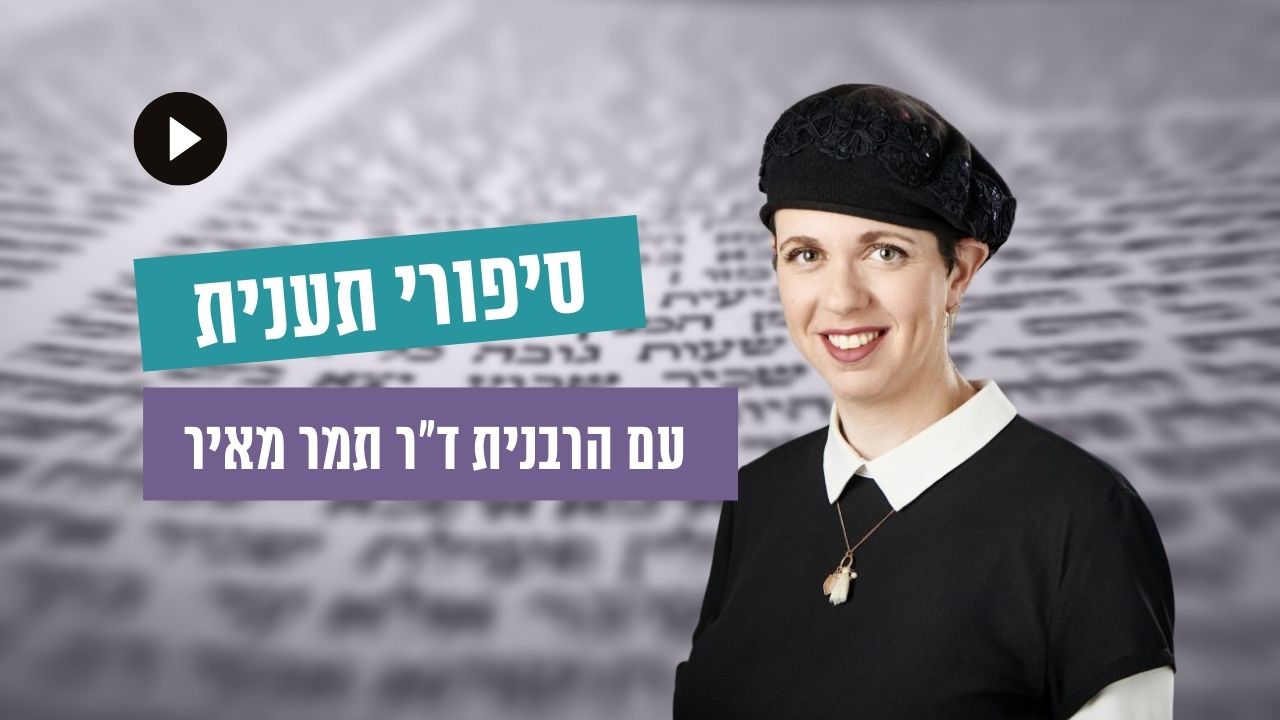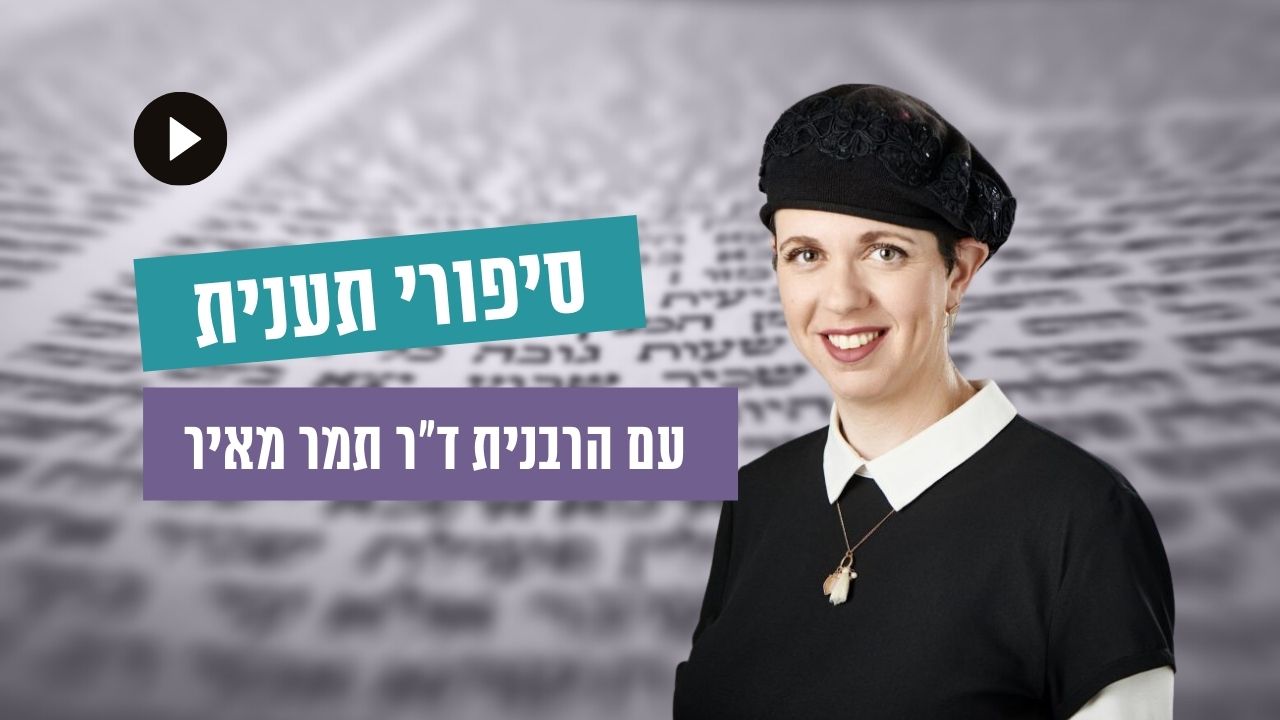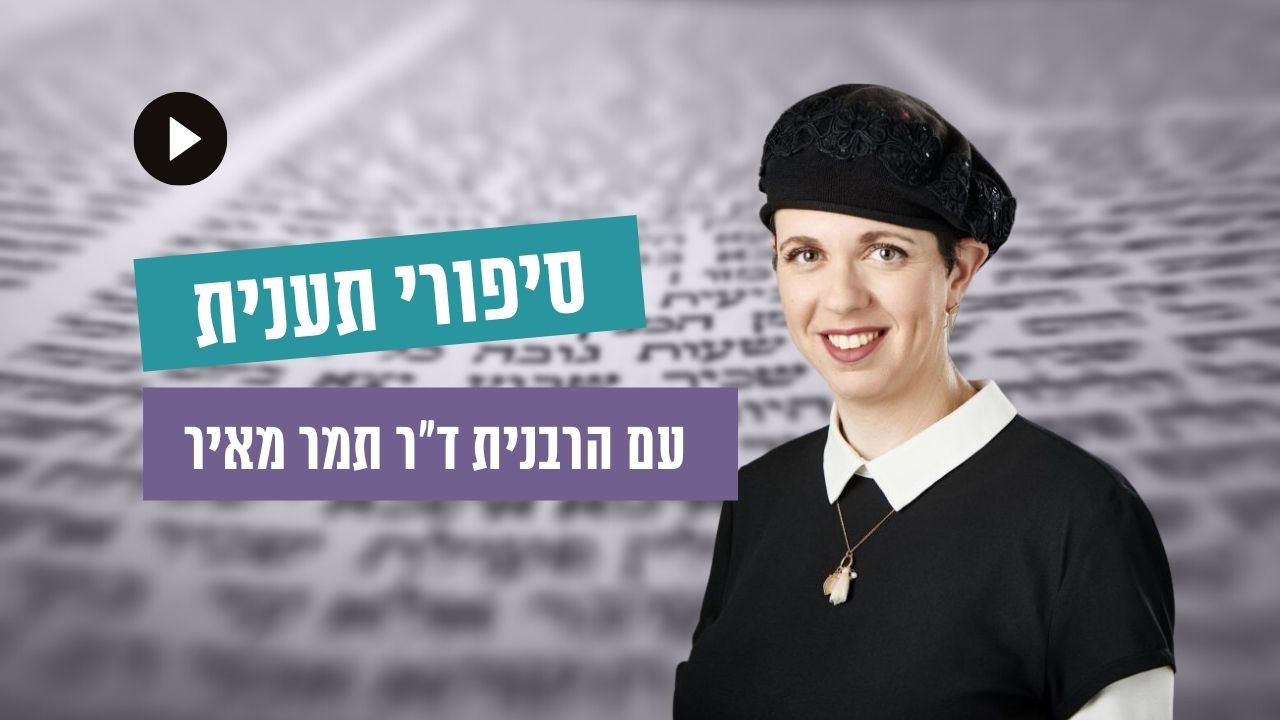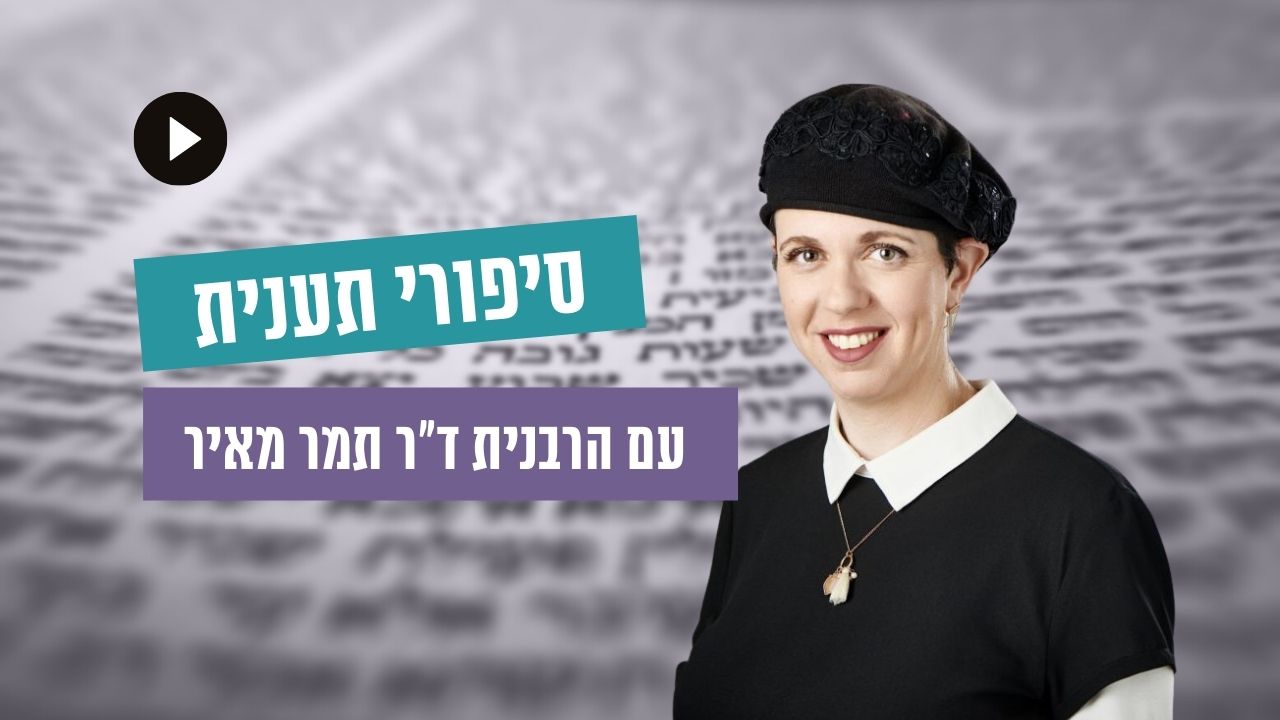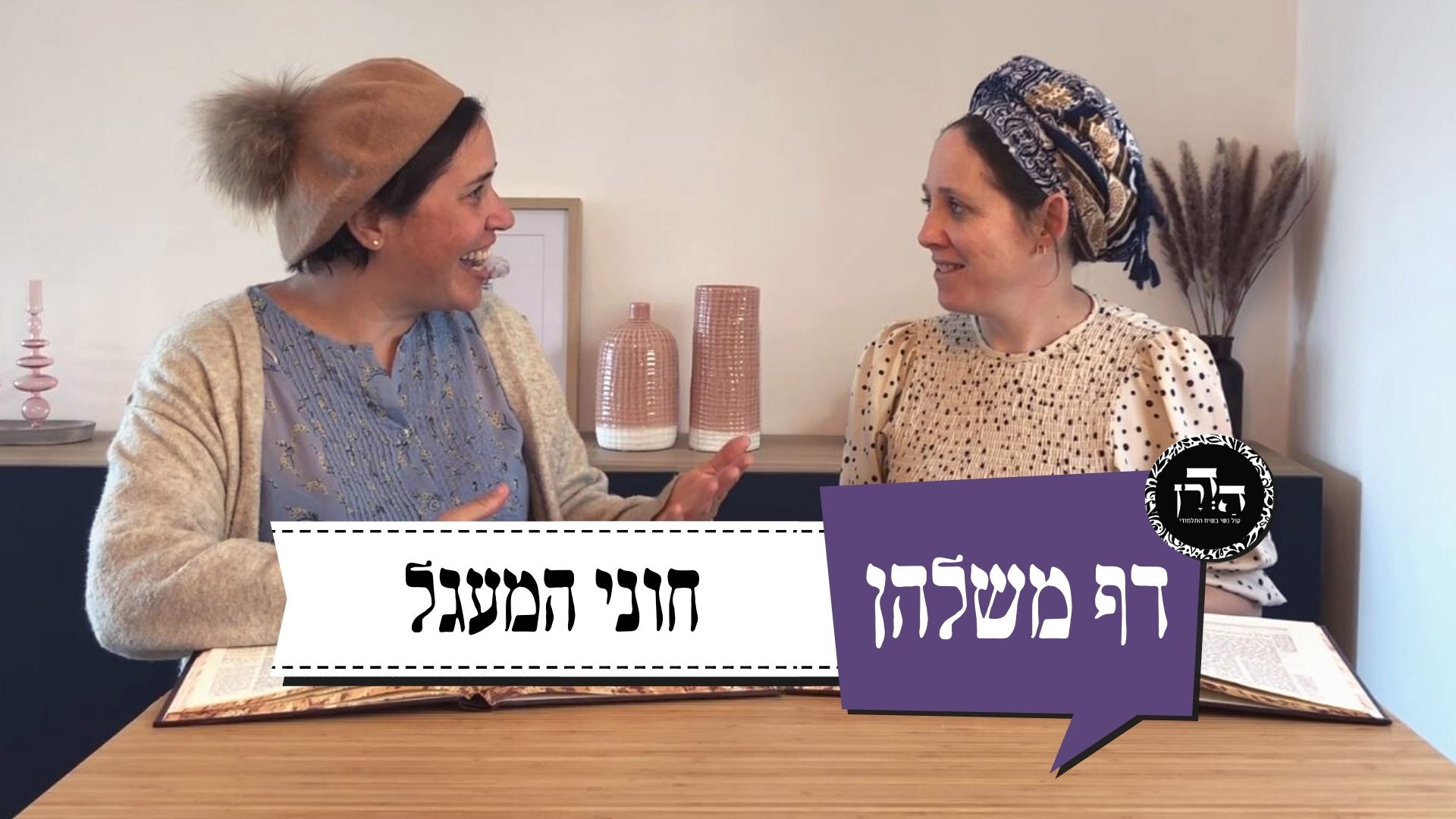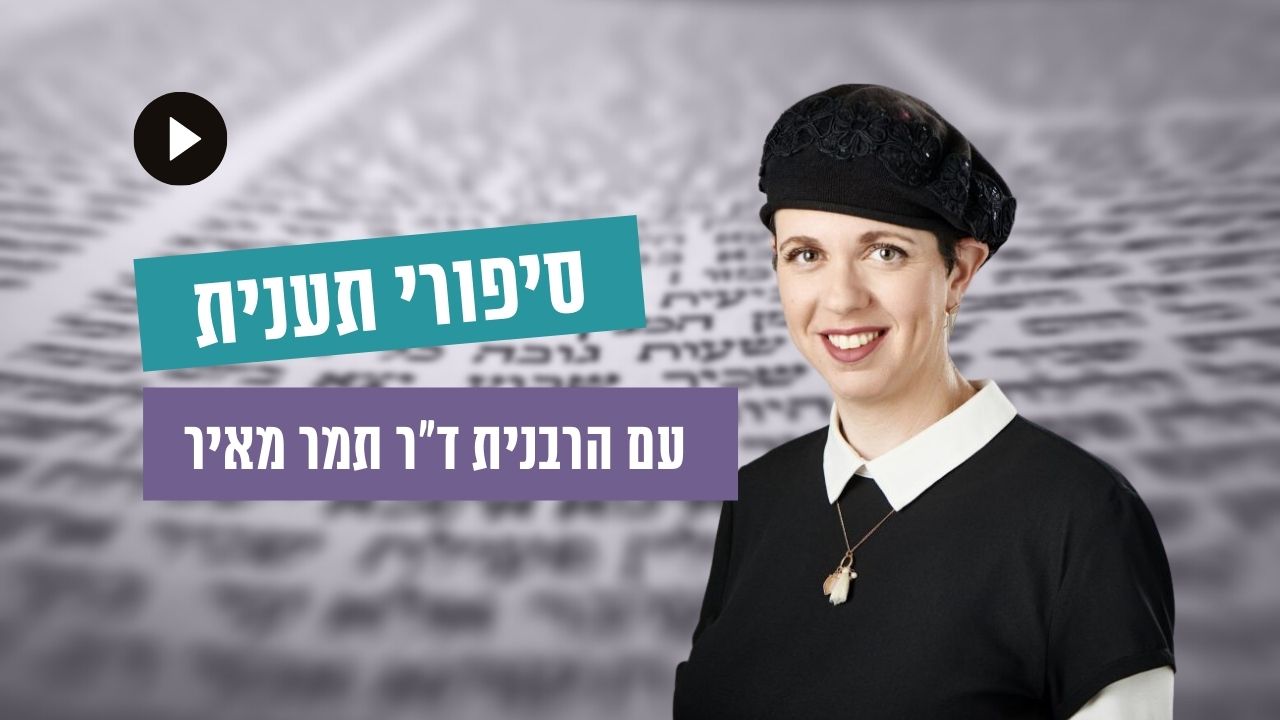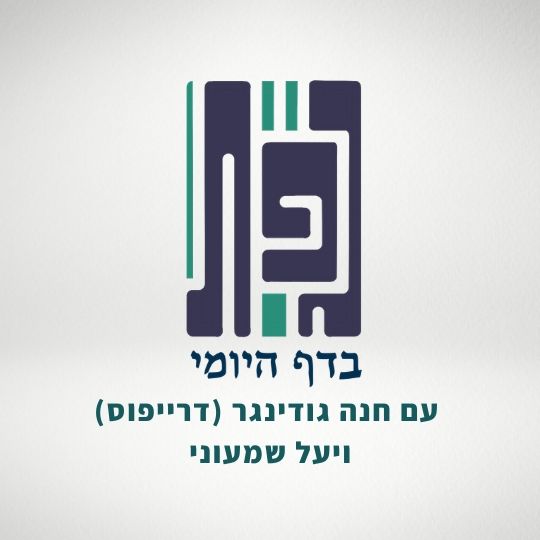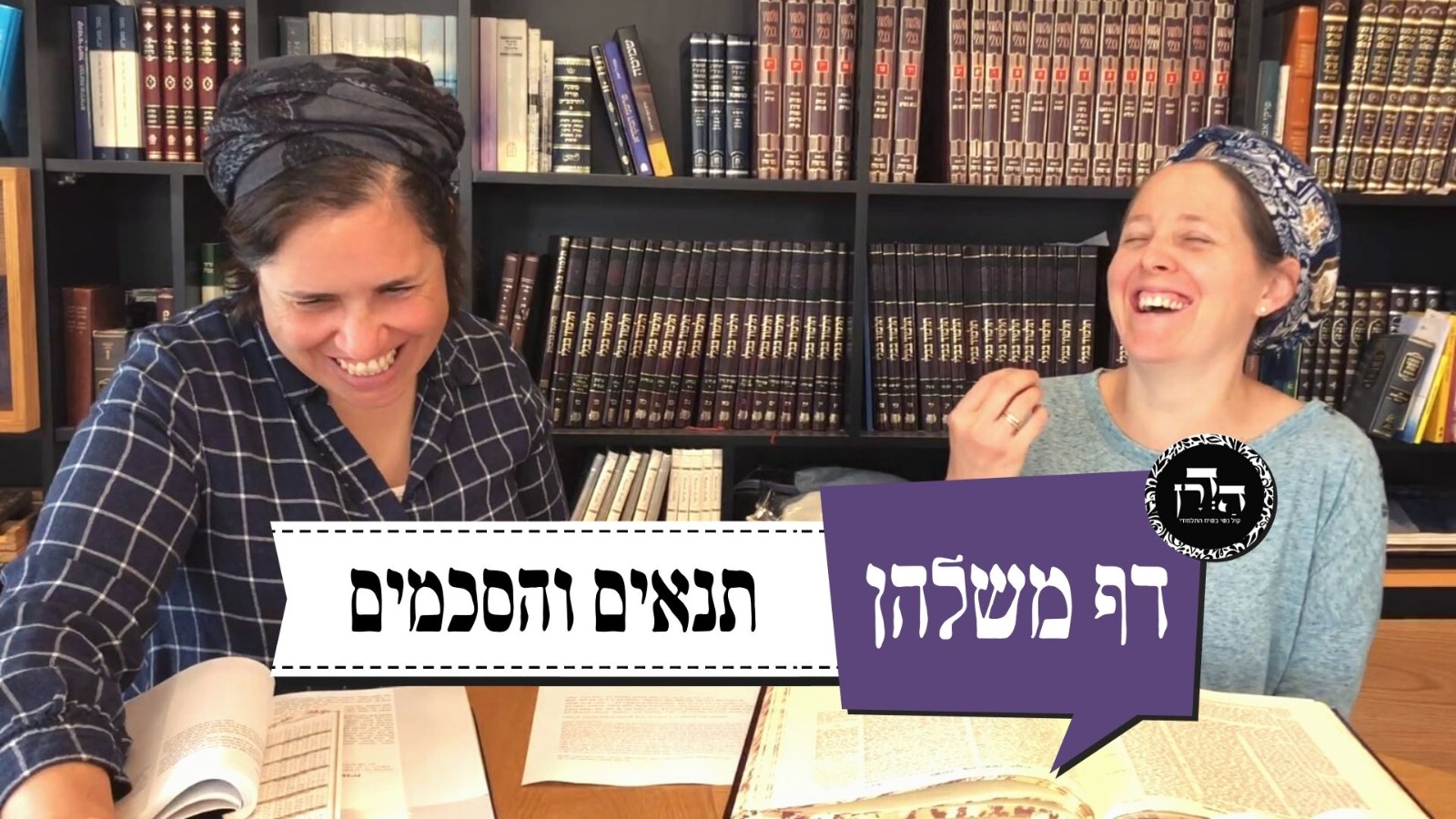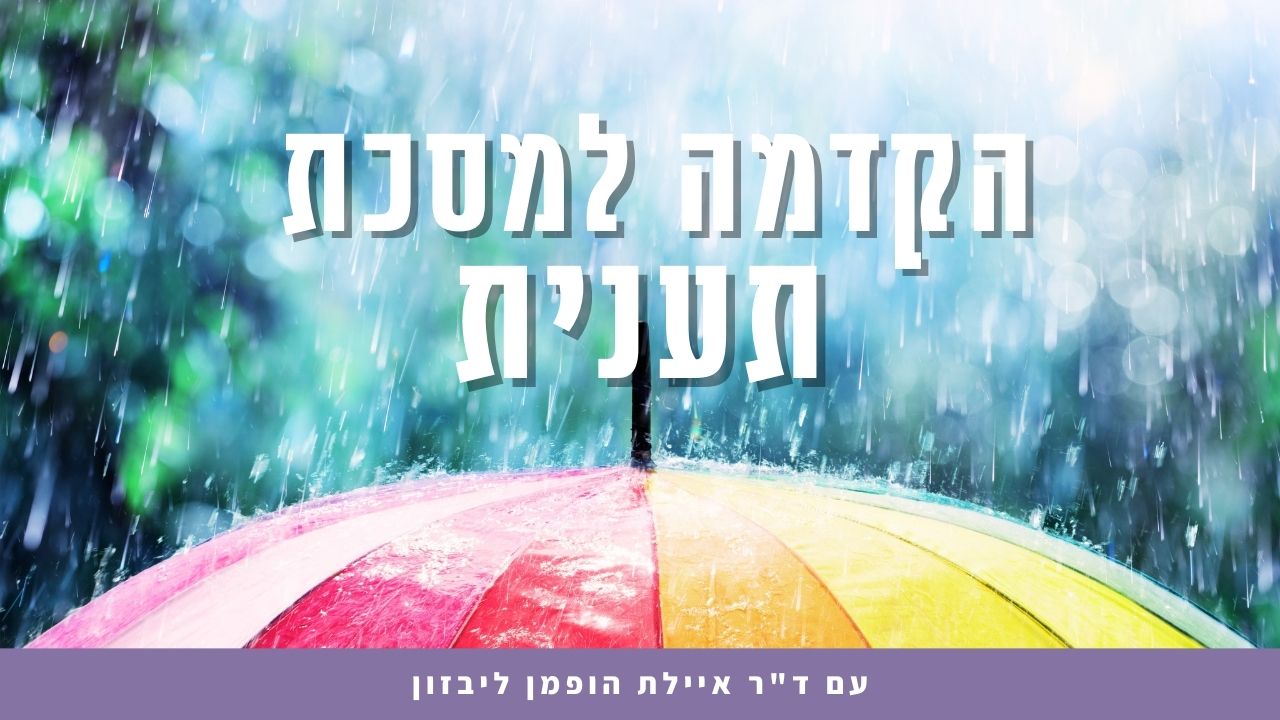רבי יוחנן ואילפא התמודדו בשאלה האם לעזוב את בית המדרש בכדי להתפרנס. אילפא בחר לעזוב את בית המדרש ולעבוד. גם ר’ יוחנן חשב לעשות ככה יחד איתו, אך לאחר ששמע שיחה בין מלאכים, החליט להישאר בבית המדרש. כשאילפא חזר לבית המדרש, רבי יוחנן כבר היה ראש הישיבה ואילפא תהה האם קיבל החלטה נכונה. הוא החליט לעשות מבחן לראות אם הוא קיבל החלטה נכונה או לא. מובאים סיפורים על נחום איש גמזו – שתמיד היה אומר "גם זו לטובה”. הסיפור הראשון דומה לסיפורים מתענית דף כ כי מדובר בקיר שעמד להתמוטט וזכויותיו של נחום איש גם זו החזיק אותם. מהן הדעות השונות בנוגע למספרים לגבי מהי דבר שבגינה צריך לקבוע תעניות? רב נחמן בנו של רב חסדא התחנן בפני רב נחמן בר יצחק שיעבור לגור בקרבתו אך הוא לא התעניין. היו כמה ערים עם דבר או שריפה אבל שכונה מסוימת נחסכה. הם חשבו שזה בגלל רב חשוב שחי ביניהם אבל זה לא היה המצב – זה היה בגלל אנשים פשוטים שעזרו לאחרים בקהילה. באילו מקרים צריך לדאוג שאסון בעיר סמוכה אולי יגיע גם לאיזור אחר ובגלל זה עליהם גם לקבוע תעניות? אבא אומנה (מקיז דם היה) היה מקבל ברכות מהישיבה של מעלה מדי יום, אביי היה מקבל כל ערב שבת, ורבא בערב יום כיפור. מה עשה אבא אומנה בחייו שזכה לכבוד זה? אביי קינא בזה ורצה לבחון את אבא אומנה.
הלימוד החודש מוקדש לרפואת פיליס הכט, גיטל פעשא בת מאשה רחל על ידי חברותיה הרבות שאוהבות ומעריכות אותה.
הלימוד השבוע מוקדש ע”י נירה פלדמן לע”נ פיי דרק.
הלימוד השבוע מוקדש ע”י נירה פלדמן לע”נ פיי דרק.
רוצה להקדיש שיעור?

כלים
הלימוד החודש מוקדש לרפואת פיליס הכט, גיטל פעשא בת מאשה רחל על ידי חברותיה הרבות שאוהבות ומעריכות אותה.
הלימוד השבוע מוקדש ע”י נירה פלדמן לע”נ פיי דרק.
הלימוד השבוע מוקדש ע”י נירה פלדמן לע”נ פיי דרק.
כלים
העמקה
רוצה להבין מה באמת קורה מתחת לפני השטח של הסוגיה?
שיעורים, פודקאסטים והרחבות של מיטב המורות שלנו יפתחו לך עוד זוויות וכיווני חשיבה.
חדשה בלימוד הגמרא?
זה הדף הראשון שלך? איזו התרגשות עצומה! יש לנו בדיוק את התכנים והכלים שיעזרו לך לעשות את הצעדים הראשונים ללמידה בקצב וברמה שלך, כך תוכלי להרגיש בנוח גם בתוך הסוגיות המורכבות ומאתגרות.
פסיפס הלומדות שלנו
גלי את קהילת הלומדות שלנו, מגוון נשים, רקעים וסיפורים. כולן חלק מתנועה ומסע מרגש ועוצמתי.
תענית כא
מִשּׁוּם דִּנְפִישִׁי בְּנֵי חֵילָא דְּמָחוֹזָא.
due to the fact that there are many soldiers in the city of Meḥoza, and if I let them all eat, they will take all the food I own.
אִילְפָא וְרַבִּי יוֹחָנָן הֲווֹ גָּרְסִי בְּאוֹרָיְיתָא, דְּחִיקָא לְהוּ מִילְּתָא טוּבָא, אָמְרִי: נֵיקוּם וְנֵיזִיל וְנֶיעְבַּד עִיסְקָא וּנְקַיֵּים בְּנַפְשִׁין ״אֶפֶס כִּי לֹא יִהְיֶה בְּךָ אֶבְיוֹן״. אֲזַלוּ, אוֹתִיבוּ תּוּתֵי גּוּדָּא רְעִיעָא, הֲווֹ קָא כָּרְכִי רִיפְתָּא, אֲתוֹ תְּרֵי מַלְאֲכֵי הַשָּׁרֵת.
§ The Gemara relates another story that involves an unstable wall. Ilfa and Rabbi Yoḥanan studied Torah together, and as a result they became very hard-pressed for money. They said: Let us get up and go and engage in commerce, and we will fulfill, with regard to ourselves, the verse: “Although there should be no needy among you” (Deuteronomy 15:4), as we will no longer be complete paupers. They went and sat under a dilapidated wall and were eating bread, when two ministering angels arrived.
שַׁמְעֵיהּ רַבִּי יוֹחָנָן דְּאָמַר חַד לְחַבְרֵיהּ: נִישְׁדֵּי עֲלַיְיהוּ הַאי גּוּדָּא וְנִקְטְלִינְהוּ, שֶׁמַּנִּיחִין חַיֵּי עוֹלָם הַבָּא וְעוֹסְקִין בְּחַיֵּי שָׁעָה! אֲמַר לֵיהּ אִידַּךְ: שַׁבְקִינְהוּ, דְּאִיכָּא בְּהוּ חַד דְּקָיְימָא לֵיהּ שַׁעְתָּא. רַבִּי יוֹחָנָן שְׁמַע, אִילְפָא לָא שְׁמַע. אֲמַר לֵיהּ רַבִּי יוֹחָנָן לְאִילְפָא: שָׁמַע מָר מִידֵּי? אֲמַר לֵיהּ: לָא. אֲמַר מִדִּשְׁמַעִי אֲנָא וְאִילְפָא לָא שְׁמַע, שְׁמַע מִינַּהּ לְדִידִי קָיְימָא לִי שַׁעְתָּא.
Rabbi Yoḥanan heard that one angel said to the other: Let us knock this wall down upon them and kill them, as they abandon eternal life of Torah study and engage in temporal life for their own sustenance. The other angel said to him: Leave them, as there is one of them whose time of achievement stands before him, i.e., his time has yet to come. Rabbi Yoḥanan heard all this, but Ilfa did not hear the angels’ conversation. Rabbi Yoḥanan said to Ilfa: Did the Master hear anything? Ilfa said to him: No. Rabbi Yoḥanan said to himself: Since I heard the angels and Ilfa did not hear, I can learn from this that it is I whose time of achievement stands before me.
אֲמַר לֵיהּ רַבִּי יוֹחָנָן: אֶיהֱדַר, וְאוֹקֵי בְּנַפְשַׁאי ״כִּי לֹא יֶחְדַּל אֶבְיוֹן מִקֶּרֶב הָאָרֶץ״. רַבִּי יוֹחָנָן הֲדַר, אִילְפָא לָא הֲדַר. עַד דַּאֲתָא אִילְפָא, מָלֵיךְ רַבִּי יוֹחָנָן.
Rabbi Yoḥanan said to Ilfa: I will return home and fulfill with regard to myself the contrary verse: “For the poor shall never cease out of the land” (Deuteronomy 15:11). Rabbi Yoḥanan returned to the study hall, and Ilfa did not return, but went to engage in business instead. By the time that Ilfa came back from his business travels, Rabbi Yoḥanan had been appointed head of the academy, and his financial situation had improved.
אָמְרוּ לוֹ: אִי אִתִּיב מָר וְגָרֵיס, לָא הֲוָה מָלֵיךְ מָר. אֲזַל תְּלָא נַפְשֵׁיהּ בְּאַסְקַרְיָא דִסְפִינְתָּא, אֲמַר: אִי אִיכָּא דְּשָׁאֵיל לִי בְּמַתְנִיתָא דְּרַבִּי חִיָּיא וְרַבִּי אוֹשַׁעְיָא וְלָא פָּשֵׁיטְנָא לֵיהּ מִמַּתְנִיתִין, נָפֵילְנָא מֵאַסְקַרְיָא דִסְפִינְתָּא וְטָבַעְנָא.
His colleagues said to Ilfa: If the Master had sat and studied, instead of going off to his business ventures, wouldn’t the Master have been appointed head of the academy? Ilfa went and suspended himself from the mast [askariya] of a ship, saying: If there is anyone who can ask me a question concerning a baraita of Rabbi Ḥiyya and Rabbi Oshaya, and I do not resolve his problem from a mishna, I will fall from the mast of this ship and be drowned. Ilfa sought to demonstrate that despite the time he had spent in business, he still retained his extensive Torah knowledge.
אֲתָא הָהוּא סָבָא, תְּנָא לֵיהּ: הָאוֹמֵר תְּנוּ שֶׁקֶל לְבָנַיי בְּשַׁבָּת, וְהֵן רְאוּיִין לָתֵת לָהֶם סֶלַע — נוֹתְנִין לָהֶם סֶלַע. וְאִם אָמַר: אַל תִּתְּנוּ לָהֶם אֶלָּא שֶׁקֶל — אֵין נוֹתְנִין לָהֶם אֶלָּא שֶׁקֶל.
A certain old man came and taught a baraita before him: If there is a man who, upon his deathbed, says in his will: Give a shekel to my sons every week, but this is a situation where, based on their needs, they are fit for the court to give them a sela, i.e., double the amount, they give them a sela. When the dying man mentioned a shekel, he presumably meant that they should be given a sum in accordance with their actual requirements, not that specific amount. But if he said: Give them only a shekel, the court gives them only a shekel and no more.
אִם אָמַר: אִם מֵתוּ יִרְשׁוּ אֲחֵרִים תַּחְתֵּיהֶם — בֵּין שֶׁאָמַר ״תְּנוּ״ בֵּין שֶׁאָמַר ״אַל תִּתְּנוּ״ — אֵין נוֹתְנִין לָהֶם אֶלָּא שֶׁקֶל. אֲמַר לֵיהּ: הָא מַנִּי — רַבִּי מֵאִיר הִיא, דְּאָמַר: מִצְוָה לְקַיֵּים דִּבְרֵי הַמֵּת.
The baraita further states that if one said: If my sons die, others should inherit their portion in their stead, regardless of whether he said: Give them a shekel, or whether he said: Give them only a shekel, then the court gives his sons only a shekel per week, as their father clearly stated that he wishes to give his sons only a specific stipend and that he intends to leave the bulk of his property to others. Ilfa said to the old man: In accordance with whose opinion is this ruling? It is in accordance with the opinion of Rabbi Meir, who said: It is a mitzva to fulfill the statement of the dead. This entire baraita can be explained based on a principle that appears in a mishna: In all cases, one should try to execute the wishes of the deceased.
אָמְרוּ עָלָיו עַל נַחוּם אִישׁ גַּם זוֹ שֶׁהָיָה סוֹמֵא מִשְׁתֵּי עֵינָיו, גִּדֵּם מִשְׁתֵּי יָדָיו, קִיטֵּעַ מִשְׁתֵּי רַגְלָיו, וְכׇל גּוּפוֹ מָלֵא שְׁחִין. וְהָיָה מוּטָּל בְּבַיִת רָעוּעַ, וְרַגְלֵי מִטָּתוֹ מוּנָּחִין בִּסְפָלִין שֶׁל מַיִם כְּדֵי שֶׁלֹּא יַעֲלוּ עָלָיו נְמָלִים. פַּעַם אַחַת בִּקְּשׁוּ תַּלְמִידָיו לְפַנּוֹת מִטָּתוֹ, וְאַחַר כָּךְ לְפַנּוֹת אֶת הַכֵּלִים. אָמַר לָהֶם: בָּנַיי, פַּנּוּ אֶת הַכֵּלִים, וְאַחַר כָּךְ פַּנּוּ אֶת מִטָּתִי, שֶׁמּוּבְטָח לָכֶם שֶׁכׇּל זְמַן שֶׁאֲנִי בַּבַּיִת אֵין הַבַּיִת נוֹפֵל. פִּינּוּ אֶת הַכֵּלִים וְאַחַר כָּךְ פִּינּוּ אֶת מִטָּתוֹ, וְנָפַל הַבַּיִת.
§ The Gemara relates another story about a rundown building. They said about Naḥum of Gam Zu that he was blind in both eyes, both his arms were amputated, both his legs were amputated, and his entire body was covered in boils. And he was lying in a dilapidated house, and legs of his bed were placed in buckets of water so that ants should not climb onto him, as he was unable to keep them off in any other manner. Once his students sought to remove his bed from the house and afterward remove his other vessels. He said to them: My sons, remove the vessels first, and afterward remove my bed, as I can guarantee you that as long as I am in the house, the house will not fall. Indeed they removed the vessels and afterward they removed his bed, and immediately the house collapsed.
אָמְרוּ לוֹ תַּלְמִידָיו: רַבִּי, וְכִי מֵאַחַר שֶׁצַּדִּיק גָּמוּר אַתָּה, לָמָה עָלְתָה לְךָ כָּךְ? אָמַר לָהֶם: בָּנַיי, אֲנִי גָּרַמְתִּי לְעַצְמִי. שֶׁפַּעַם אַחַת הָיִיתִי מְהַלֵּךְ בַּדֶּרֶךְ לְבֵית חָמִי, וְהָיָה עִמִּי מַשּׂוֹי שְׁלֹשָׁה חֲמוֹרִים, אֶחָד שֶׁל מַאֲכָל, וְאֶחָד שֶׁל מִשְׁתֶּה, וְאֶחָד שֶׁל מִינֵי מְגָדִים. בָּא עָנִי אֶחָד וְעָמַד לִי בַּדֶּרֶךְ, וְאָמַר לִי: רַבִּי, פַּרְנְסֵנִי. אָמַרְתִּי לוֹ: הַמְתֵּן עַד שֶׁאֶפְרוֹק מִן הַחֲמוֹר. לֹא הִסְפַּקְתִּי לִפְרוֹק מִן הַחֲמוֹר עַד שֶׁיָּצְתָה נִשְׁמָתוֹ.
His students said to him: Rabbi, since you are evidently a wholly righteous man, as we have just seen that as long as you were in your house it did not fall, why has this suffering befallen you? He said to them: My sons, I brought it upon myself. Naḥum of Gam Zu related to them the following: As once I was traveling along the road to my father-in-law’s house, and I had with me a load distributed among three donkeys, one of food, one of drink, and one of delicacies. A poor person came and stood before me in the road, saying: My rabbi, sustain me. I said to him: Wait until I unload the donkey, after which I will give you something to eat. However, I had not managed to unload the donkey before his soul left his body.
הָלַכְתִּי וְנָפַלְתִּי עַל פָּנָיו, וְאָמַרְתִּי: עֵינַי שֶׁלֹּא חָסוּ עַל עֵינֶיךָ — יִסּוֹמוּ, יָדַיי שֶׁלֹּא חָסוּ עַל יָדֶיךָ — יִתְגַּדְּמוּ, רַגְלַי שֶׁלֹּא חָסוּ עַל רַגְלֶיךָ — יִתְקַטְּעוּ. וְלֹא נִתְקָרְרָה דַּעְתִּי עַד שֶׁאָמַרְתִּי: כׇּל גּוּפִי יְהֵא מָלֵא שְׁחִין. אָמְרוּ לוֹ: אוֹי לָנוּ שֶׁרְאִינוּךָ בְּכָךְ! אָמַר לָהֶם: אוֹי לִי אִם לֹא רְאִיתוּנִי בְּכָךְ.
I went and fell upon his face and said: May my eyes, which had no compassion on your eyes, be blinded; may my hands, which had no compassion on your hands, be amputated; may my legs, which had no compassion on your legs, be amputated. And my mind did not rest until I said: May my whole body be covered in boils. Naḥum of Gam Zu prayed that his suffering might atone for his failure. His students said to him: Even so, woe to us that we have seen you in this state. He said to them: Woe is me if you had not seen me in this state, as this suffering atones for me.
וְאַמַּאי קָרוּ לֵיהּ נַחוּם אִישׁ גַּם זוֹ — דְּכׇל מִילְּתָא דַּהֲוָה סָלְקָא לֵיהּ, אֲמַר: גַּם זוֹ לְטוֹבָה. זִימְנָא חֲדָא בְּעוֹ לְשַׁדּוֹרֵי יִשְׂרָאֵל דּוֹרוֹן לְבֵי קֵיסָר, אָמְרוּ: מַאן יֵיזִיל — יֵיזִיל נַחוּם אִישׁ גַּם זוֹ, דִּמְלוּמָּד בְּנִיסִּין הוּא. שַׁדַּרוּ בִּידֵיהּ מְלֵא סִיפְטָא דַּאֲבָנִים טוֹבוֹת וּמַרְגָּלִיּוֹת. אֲזַל, בָּת בְּהָהוּא דִּירָא. בְּלֵילְיָא קָמוּ הָנָךְ דָּיוֹרָאֵי וְשַׁקְלִינְהוּ לְסִיפְטֵיהּ וּמְלוֹנְהוּ עַפְרָא.
The Gemara inquires: And why did they call him Naḥum of Gam Zu? The reason is that with regard to any matter that occurred to him, he would say: This too is for the good [gam zu letova]. Once, the Jews wished to send a gift [doron] to the house of the emperor. They said: Who should go and present this gift? Let Naḥum of Gam Zu go, as he is accustomed to miracles. They sent with him a chest [sifta] full of jewels and pearls, and he went and spent the night in a certain inn. During the night, these residents of the inn arose and took all of the precious jewels and pearls from the chest, and filled it with earth. The next day, when he saw what had happened, Naḥum of Gam Zu said: This too is for the good.
כִּי מְטָא הָתָם, שְׁרִינְהוּ לְסִיפְטֵי, חֲזָנְהוּ דִּמְלוּ עַפְרָא. בְּעָא מַלְכָּא לְמִקְטְלִינְהוּ לְכוּלְּהוּ, אֲמַר: קָא מְחַיְּיכוּ בִּי יְהוּדָאֵי. אֲמַר: גַּם זוֹ לְטוֹבָה. אֲתָא אֵלִיָּהוּ אִדְּמִי לֵיהּ כְּחַד מִינַּיְיהוּ, אֲמַר לֵיהּ: דִּלְמָא הָא עַפְרָא מֵעַפְרָא דְּאַבְרָהָם אֲבוּהוֹן הוּא, דְּכִי הֲוָה שָׁדֵי עַפְרָא — הָווּ סַיְיפֵי, גִּילֵי — הָווּ גִּירֵי, דִּכְתִיב: ״יִתֵּן כֶּעָפָר חַרְבּוֹ כְּקַשׁ נִדָּף קַשְׁתּוֹ״.
When he arrived there, at the ruler’s palace, they opened the chest and saw that it was filled with earth. The king wished to put all the Jewish emissaries to death. He said: The Jews are mocking me. Naḥum of Gam Zu said: This too is for the good. Elijah the Prophet came and appeared before the ruler as one of his ministers. He said to the ruler: Perhaps this earth is from the earth of their father Abraham. As when he threw earth, it turned into swords, and when he threw stubble, it turned into arrows, as it is written in a prophecy that the Sages interpreted this verse as a reference to Abraham: “His sword makes them as the dust, his bow as the driven stubble” (Isaiah 41:2).
הַוְיָא חֲדָא מְדִינְתָּא דְּלָא מָצוּ לְמִיכְבְּשַׁהּ, בְּדַקוּ מִינֵּיהּ וְכַבְשׁוּהָ. עֲיַילוּ לְבֵי גִנְזֵיה וּמְלוֹהוּ לְסִיפְטֵיהּ אֲבָנִים טוֹבוֹת וּמַרְגָּלִיּוֹת, וְשַׁדְּרוּהוּ בִּיקָרָא רַבָּה.
There was one province that the Romans were unable to conquer. They took some of this earth, tested it by throwing it at their enemies, and conquered that province. When the ruler saw that this earth indeed had miraculous powers, his servants entered his treasury and filled Naḥum of Gam Zu’s chest with precious jewels and pearls and sent him off with great honor.
כִּי אֲתוֹ, בִּיתוּ בְּהָהוּא דִּיּוּרָא, אֲמַרוּ לֵיהּ: מַאי אַיְיתֵית בַּהֲדָךְ דְּעָבְדִי לָךְ יְקָרָא כּוּלֵּי הַאי? אֲמַר לְהוּ: מַאי דִּשְׁקַלִי מֵהָכָא אַמְטִי לְהָתָם. סְתַרוּ לְדִירַיְיהוּ וְאַמְטִינְהוּ לְבֵי מַלְכָּא, אֲמַרוּ לֵיהּ: הַאי עַפְרָא דְּאַיְיתִי הָכָא — מִדִּידַן הוּא. בַּדְקוּהּ וְלָא אַשְׁכְּחוּהּ, וְקַטְלִינְהוּ לְהָנָךְ דָּיוֹרָאֵי.
When Naḥum of Gam Zu came to spend the night at that same inn, the residents said to him: What did you bring with you to the emperor that he bestowed upon you such great honor? He said to them: That which I took from here, I brought there. When they heard this, the residents of the inn thought that the soil upon which their house stood had miraculous powers. They tore down their inn and brought the soil underneath to the king’s palace. They said to him: That earth that was brought here was from our property. The miracle had been performed only in the merit of Naḥum of Gam Zu. The emperor tested the inn’s soil in battle, and it was not found to have miraculous powers, and he had these residents of the inn put to death.
אִי זוֹ הִיא דֶּבֶר — עִיר הַמּוֹצִיאָה חֲמֵשׁ מֵאוֹת רַגְלִי כּוּ׳. תָּנוּ רַבָּנַן: עִיר הַמּוֹצִיאָה חֲמֵשׁ מֵאוֹת וְאֶלֶף רַגְלִי, כְּגוֹן כְּפַר עַכּוֹ, וְיָצְאוּ הֵימֶנָּה תִּשְׁעָה מֵתִים בִּשְׁלֹשָׁה יָמִים זֶה אַחַר זֶה — הֲרֵי זֶה דֶּבֶר.
§ The mishna taught: What is considered a plague of pestilence? If it is a city that sends out five hundred infantrymen, and three dead are removed from it on three consecutive days, one dead per day, this is a plague of pestilence. The Sages taught: If a city that sends out fifteen hundred infantrymen, i.e., one that has a population of at least fifteen hundred men, e.g., the village of Akko, and nine dead are removed from it on three consecutive days, i.e., three dead per day, this is considered a plague of pestilence.
בְּיוֹם אֶחָד אוֹ בְּאַרְבָּעָה יָמִים — אֵין זֶה דֶּבֶר. וְעִיר הַמּוֹצִיאָה חֲמֵשׁ מֵאוֹת רַגְלִי, כְּגוֹן כְּפַר עֲמִיקוּ, וְיָצְאוּ הֵימֶנָּה שְׁלֹשָׁה מֵתִים בִּשְׁלֹשָׁה יָמִים זֶה אַחַר זֶה — הֲרֵי זֶה דֶּבֶר.
If all nine died on a single day, while none died on the other days, or if the nine died over a period of four days, this is not a plague of pestilence. And a city that sends out five hundred infantrymen, for example, the village of Amiko, and three dead are removed from it on three consecutive days, this is a plague of pestilence.
בְּיוֹם אֶחָד אוֹ בְּאַרְבָּעָה יָמִים — אֵין זֶה דֶּבֶר.
If all three died on one day or over four days, this is not a plague of pestilence.
דְּרוֹקֶרֶת, עִיר הַמּוֹצִיאָה חֲמֵשׁ מֵאוֹת רַגְלִי הֲוַאי, וְיָצְאוּ מִמֶּנָּה שְׁלֹשָׁה מֵתִים בְּיוֹם אֶחָד. גְּזַר רַב נַחְמָן בַּר רַב חִסְדָּא תַּעֲנִיתָא. אֲמַר רַב נַחְמָן בַּר יִצְחָק: כְּמַאן — כְּרַבִּי מֵאִיר,
In explanation of the counterintuitive ruling that many deaths in one day is not indicative of a plague, the Gemara relates: Drokart was a city that sent out five hundred infantrymen, and three dead were removed from it on one day. Rav Naḥman bar Rav Ḥisda decreed a fast on account of the plague. Rav Naḥman bar Yitzḥak said: In accordance with whose opinion did you declare this fast? It must be in accordance with the opinion of Rabbi Meir.
דְּאָמַר: רִיחֵק נְגִיחוֹתָיו — חַיָּיב, קֵירַב נְגִיחוֹתָיו — לֹא כׇּל שֶׁכֵּן?!
This is related to the definition of a forewarned ox, an animal that has gored enough times to be considered a dangerous beast that requires careful supervision, as Rabbi Meir said: The owner of an ox is liable to pay full damages if its acts of goring were separated, i.e., if it gored three times on three consecutive days, as claimed by the Rabbis. If its acts of goring were near each other, performed on a single day, is it not all the more so that this animal should be classified as a forewarned ox? However, Rav Naḥman bar Yitzḥak continued, this represents a minority opinion. Just as Rabbi Meir’s reasoning is rejected for halakha in the case of an ox, so too it is rejected with regard to a plague.
אֲמַר לֵיהּ רַב נַחְמָן בַּר רַב חִסְדָּא לְרַב נַחְמָן בַּר יִצְחָק: לֵיקוּם מָר לֵיתֵי לְגַבַּן. אֲמַר לֵיהּ: תְּנֵינָא, רַבִּי יוֹסֵי אוֹמֵר: לֹא מְקוֹמוֹ שֶׁל אָדָם מְכַבְּדוֹ, אֶלָּא אָדָם מְכַבֵּד אֶת מְקוֹמוֹ. שֶׁכֵּן מָצִינוּ בְּהַר סִינַי, שֶׁכׇּל זְמַן שֶׁהַשְּׁכִינָה שְׁרוּיָה עָלָיו, אָמְרָה תּוֹרָה: ״גַּם הַצֹּאן וְהַבָּקָר אַל יִרְעוּ אֶל מוּל הָהָר הַהוּא״, נִסְתַּלְּקָה שְׁכִינָה מִמֶּנּוּ, אָמְרָה תּוֹרָה: ״בִּמְשֹׁךְ הַיֹּבֵל הֵמָּה יַעֲלוּ בָהָר״.
Upon hearing this impressive argument, Rav Naḥman bar Rav Ḥisda said to Rav Naḥman bar Yitzḥak: Let the Master arise and come to live with us as our community leader. Rav Naḥman bar Yitzḥak said to him: We already learned in a baraita that Rabbi Yosei says: It is not the place of a person that honors him; rather, the person honors his place, as we found with regard to Mount Sinai, that as long as the Divine Presence rested upon it, the Torah said: “Neither let the flocks nor the herds feed before that mount” (Exodus 34:3). Once the Divine Presence departed from the mountain, the Torah said: “When the shofar sounds long they shall come up to the mount” (Exodus 19:13). This indicates that the sanctity was not inherent to the place but was due to the Divine Presence resting there.
וְכֵן מָצִינוּ בְּאֹהֶל מוֹעֵד שֶׁבַּמִּדְבָּר, שֶׁכׇּל זְמַן שֶׁהוּא נָטוּי אָמְרָה תּוֹרָה: ״וִישַׁלְּחוּ מִן הַמַּחֲנֶה כׇּל צָרוּעַ״, הוּגְלְלוּ הַפָּרוֹכוֹת — הוּתְּרוּ זָבִין וּמְצוֹרָעִים לִיכָּנֵס שָׁם.
And we likewise found with regard to the Tent of Meeting that was in the wilderness, that whenever it was erected, the Torah said: “That they put out of the camp every leper” (Numbers 5:2). Once the curtain was rolled up and the Tent of Meeting was prepared for travel, zavim and lepers were permitted to enter the place where it had stood. The place itself had no intrinsic sanctity; rather, it was sacred only because the Divine Presence was there. Accordingly, Rav Naḥman bar Yitzḥak maintained that there is no reason for him to move places to receive honor.
אֲמַר לֵיהּ: אִי הָכִי, נֵיקוּם אֲנָא לְגַבֵּי מָר. אֲמַר לֵיהּ: מוּטָב יָבֹא מָנֶה בֶּן פְּרָס אֵצֶל מָנֶה בֶּן מָנֶה, וְאַל יָבֹא מָנֶה בֶּן מָנֶה אֵצֶל מָנֶה בֶּן פְּרָס.
Rav Naḥman bar Rav Ḥisda said to Rav Naḥman bar Yitzḥak: If so, let me arise and come to the Master, to learn Torah from you. Rav Naḥman bar Yitzḥak said to him: It is better that one hundred dinars that is the son of a peras, fifty dinars, should come to one hundred dinars that is the son of one hundred dinars; but one hundred dinars that is the son of one hundred dinars, should not come to one hundred dinars that is the son of a peras. In other words, although Rav Naḥman bar Yitzḥak was a learned scholar, comparable to one hundred dinars, it was nevertheless more appropriate for him to come to Rav Naḥman bar Rav Ḥisda. Whereas Rav Naḥman bar Yitzḥak was the son of a peras, an ordinary man, Rav Naḥman bar Rav Ḥisda was the son of a scholar.
בְּסוּרָא הֲווֹת דְּבַרְתָּא, בְּשִׁיבָבוּתֵיהּ דְּרַב לָא הֲווֹת דְּבַרְתָּא. סְבוּר מִינַּהּ, מִשּׁוּם זְכוּתֵיהּ דְּרַב דִּנְפִישׁ. אִיתְחֲזִי לְהוּ בְּחֶילְמָא: רַב דִּנְפִישָׁא זְכוּתֵיהּ טוּבָא — הָא מִילְּתָא זוּטְרָא לֵיהּ לְרַב. אֶלָּא, מִשּׁוּם הָהוּא גַּבְרָא דִּמְשַׁיֵּיל מָרָא וּזְבִילָא לִקְבוּרָה.
The Gemara relates another story involving a plague: Once there was a plague of pestilence in Sura, but in the neighborhood of Rav there was no pestilence. The people therefore thought that this was due to Rav’s great merit. However, it was revealed to them in a dream that Rav’s merit was too great and this matter too small for the merit of Rav to be involved. Rather, his neighborhood was spared due to the acts of kindness of a certain man, who would lend his hoe [mara] and shovel [zevila] to prepare sites for burial.
בִּדְרוֹקֶרֶת הֲווֹת דְּלֵיקְתָּא, וּבְשִׁיבָבוּתֵיהּ דְּרַב הוּנָא לָא הֲווֹת דְּלֵיקְתָּא. סְבוּר מִינַּהּ, בִּזְכוּתָא דְּרַב הוּנָא דִּנְפִישׁ. אִיתְחֲזִי לְהוּ בְּחֶילְמָא: הַאי זוּטְרָא לֵיהּ לְרַב הוּנָא, אֶלָּא מִשּׁוּם הָהִיא אִיתְּתָא דִּמְחַמְּמָא תַּנּוּרָא וּמְשַׁיְּילָא לְשִׁיבָבוּתַיהּ.
The Gemara relates a similar incident. In Drokart there was a fire, but in the neighborhood of Rav Huna there was no fire. The people therefore thought that this was due to Rav Huna’s great merit. It was revealed to them in a dream that this matter was too small for the merit of Rav Huna to have played a role. Rather, it was due to a certain woman who heats her oven and lends it, i.e., the use of her oven, to her neighbors.
אֲמַרוּ לֵיהּ לְרַב יְהוּדָה: אֲתוֹ קַמְצֵי. גְּזַר תַּעֲנִיתָא. אֲמַרוּ לֵיהּ: לָא קָא מַפְסְדָן. אֲמַר לְהוּ: זְווֹדֵא אַיְיתוֹ בַּהֲדַיְיהוּ?
They said to Rav Yehuda: Locusts have come to our region. Rav Yehuda decreed a fast. They said to him: They are not destroying anything, as they are eating only a little. He said to them: Have they brought provisions with them, that they have something else to eat? Even if they are not damaging your crops now, they will certainly eat them soon.
אֲמַרוּ לֵיהּ לְרַב יְהוּדָה: אִיכָּא מוֹתָנָא בַּחֲזִירֵי. גְּזַר תַּעֲנִיתָא. נֵימָא קָסָבַר רַב יְהוּדָה מַכָּה מְשׁוּלַּחַת מִמִּין אֶחָד מְשׁוּלַּחַת מִכׇּל הַמִּינִין? לָא, שָׁאנֵי חֲזִירֵי — דְּדׇמְיָין מְעַיְיהוּ לִבְנֵי אִינָשֵׁי.
On another occasion, they said to Rav Yehuda: There is pestilence among the pigs. Rav Yehuda decreed a fast. The Gemara asks: Let us say that Rav Yehuda maintains that a plague affecting one species will come to affect all species, and that is why he decreed a fast. The Gemara answers: No, in other cases there is no cause for concern. However, pigs are different, as their intestines are similar to those of humans. Consequently, their disease might spread to people.
אֲמַרוּ לֵיהּ לִשְׁמוּאֵל: אִיכָּא מוֹתָנָא בֵּי חוֹזָאֵי. גְּזַר תַּעֲנִיתָא. אָמְרִי לֵיהּ: וְהָא מְרַחַק! אֲמַר: לֵיכָּא מַעְבָּרָא הָכָא דְּפָסֵיק לֵיהּ.
They said to Shmuel: There is pestilence in the region of Bei Ḥozai, which is quite a distance from Babylonia. Shmuel decreed a fast. They said to him: But it is far from here. He said: There is no crossing here that will stop the pestilence, and therefore there is cause for concern that it will reach us.
אֲמַרוּ לֵיהּ לְרַב נַחְמָן: אִיכָּא מוֹתָנָא בְּאַרְעָא דְיִשְׂרָאֵל. גְּזַר תַּעֲנִיתָא אֲמַר: אִם גְּבִירָה לוֹקָה, שִׁפְחָה לֹא כׇּל שֶׁכֵּן!
They said to Rav Naḥman: There is pestilence in Eretz Yisrael. Rav Naḥman decreed a fast in Babylonia, saying: If the lady of the house, i.e., Eretz Yisrael, is afflicted, is it not all the more so that the maidservant, Babylonia, will be afflicted?
טַעְמָא דִּגְבִירָה וְשִׁפְחָה, הָא שִׁפְחָה וְשִׁפְחָה — לָא. וְהָא אֲמַרוּ לֵיהּ לִשְׁמוּאֵל: אִיכָּא מוֹתָנָא בֵּי חוֹזָאֵי, גְּזַר תַּעֲנִיתָא! שָׁאנֵי הָתָם, כֵּיוָן דְּאִיכָּא שַׁיָּירָתָא דְּלַוִּוי וְאָתְיָא בַּהֲדֵיהּ.
The Gemara asks: The reason for this ruling is apparently only because Eretz Yisrael is a lady in comparison to the Diaspora, which is likened to a maidservant. It may be inferred from this that in a case involving a maidservant and a maidservant, i.e., two places in the Diaspora, there is no reason to fast. But in the previous story, when they said to Shmuel: There is pestilence in the region of Bei Ḥozai, he decreed a fast in Neharde’a, despite the fact that Neharde’a is not considered a lady with respect to Bei Ḥozai. The Gemara answers: It is different there. Since there are caravans that regularly travel from Bei Ḥozai to Neharde’a, the pestilence will join and accompany them in the caravans.
אַבָּא אוּמָּנָא הֲוָה אָתֵי לֵיהּ שְׁלָמָא מִמְּתִיבְתָּא דִּרְקִיעָא כֹּל יוֹמָא, וּלְאַבָּיֵי כֹּל מַעֲלֵי יוֹמָא דְּשַׁבְּתָא, לְרָבָא כֹּל מַעֲלֵי יוֹמָא דְכִיפּוּרֵי. הֲוָה קָא חָלְשָׁא דַּעְתֵּיהּ דְּאַבָּיֵי מִשּׁוּם דְּאַבָּא אוּמָּנָא. אֲמַרוּ לֵיהּ: לָא מָצֵית לְמִיעְבַּד כְּעוֹבָדֵיהּ.
§ Apropos the above stories that deal with the merits of ordinary people, the Gemara relates: Abba the Bloodletter would receive greetings from the yeshiva on High every day, and Abaye would receive these greetings every Shabbat eve, and Rava would receive greetings only once a year on Yom Kippur eve. Abaye was distressed due to Abba the Bloodletter, as he did not understand why Abba received greater honor than he did. They said to him: You are unable to perform what he does, and therefore you do not merit the same honor.
וּמַאי הֲווֹ עוֹבָדֵיהּ דְּאַבָּא אוּמָּנָא — דְּכִי הֲוָה עָבֵיד מִילְּתָא, הֲוָה מַחֵית גַּבְרֵי לְחוֹד וְנָשֵׁי לְחוֹד, וְאִית לֵיהּ לְבוּשָׁא דְּאִית בֵּיהּ קַרְנָא דַּהֲווֹת בְּזִיעָא כִּי כוּסִילְתָּא. כִּי הֲווֹת אָתְיָא לֵיהּ אִיתְּתָא, הֲוָה מַלְבֵּישׁ לָהּ כִּי הֵיכִי דְּלָא נִיסְתַּכַּל בָּהּ. וְאִית לֵיהּ דּוּכְתָּא דִּצְנִיעָא דְּשָׁדֵי בֵּיהּ פְּשִׁיטֵי דְּשָׁקֵיל, דְּאִית לֵיהּ — שָׁדֵי בֵּיהּ, דְּלֵית לֵיהּ — לָא מִיכְּסִיף.
The Gemara asks: And what were these righteous deeds of Abba the Bloodletter? The Gemara explains that when he would perform a matter of bloodletting, he would bring in men separately from women, for reasons of modesty. And he had a special garment that had a slit in the place of the incision [kusilta] where the bloodletting instrument was inserted. When a woman came to him, he would have her dress in that garment, so that he would not see her exposed. And furthermore, he had a hidden place where he worked, where customers would place the coins [peshitei] that he would take as his fee. In this manner, one who had money would throw it there, while one who did not have money was not embarrassed.
כִּי הֲוָה אִתְרְמֵי לֵיהּ צוּרְבָּא מֵרַבָּנַן, אַגְרָא מִינֵּיהּ לָא שָׁקֵיל. וּבָתַר דְּקָאֵי, יָהֵיב לֵיהּ פְּשִׁיטֵי וַאֲמַר לֵיהּ: זִיל אַבְרִי נַפְשָׁךְ. יוֹמָא חַד שַׁדַּר אַבָּיֵי זוּגָא דְרַבָּנַן לְמִיבְדְּקֵיהּ. אוֹתְבִינְהוּ וְאֹכְלִינְהוּ וְאַשְׁקִינְהוּ וּמָךְ לְהוּ בִּיסְתַּרְקִי בְּלֵילְיָא.
When a Torah scholar came to him for bloodletting, he would take no pay from him, and after the scholar arose, Abba would give him money and say to him: Go and purchase food with this money to heal yourself, as it is important to eat healthy food after bloodletting. One day, Abaye sent a pair of Sages to investigate the extent of Abba the Bloodletter’s righteousness. Abba the Bloodletter sat them down, and gave them food to eat, and gave them something to drink. And at night he spread out mats [bistarkei] for them to sleep on.
